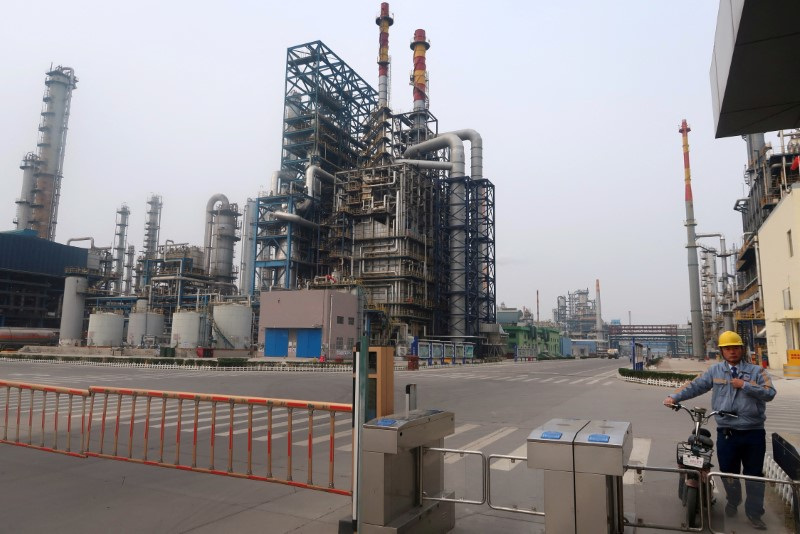By Mohi Narayan and Joyce Lee
NEW DELHI/SEOUL (Reuters) - Petrochemical producers in Europe and Asia are in survival mode as years of capacity build-up in top market China and high energy costs in Europe have depressed margins for two consecutive years, forcing firms to consolidate.
The sector's weakness is troubling for a global oil industry looking at petrochemicals to keep profits rolling in as transportation fuel demand falls in coming years with the energy transition.
Major producers in Asia and Europe are selling assets, shutting older plants, and retrofitting facilities to use cheaper raw materials such as ethane instead of naphtha to cut costs, industry executives and analysts say.
Producers will need to further consolidate ethylene and propylene capacity as oversupply is expected to persist for years with new plants still coming online in the Middle East and China, even as the Chinese economy sputters.
Ethylene and propylene, produced from petroleum products, are basic raw materials for making plastics, industrial chemicals and pharmaceuticals widely used in everyday life.
Consultancy Wood Mackenzie estimates about 24% of global petrochemical capacity is at risk of permanent closure by 2028 amid weak margins.
"We expect rationalisation in Europe and Asia to continue in this cycle," Eren Cetinkaya, a partner at McKinsey & Company said. He anticipates the current downturn will last longer than the typical five to seven years because of a prolonged capacity build-up, especially in China.
Asia's producers face the toughest outlook, with oversupply likely to persist as some companies are unlikely to curb output at new units and plants that are integrated with wider operations.
"Since 2022, however, a range of factors have made the business environment more difficult – including falling domestic demand, as well as a drastic oversupply on account of new production facilities launched in China and other parts of Asia," Mitsui Chemicals said in a statement in April.
Asian propylene production margins are expected to slide into the red this year, with losses expected to average around $20 per metric ton, consultancy Wood Mackenzie said.
In Europe, profit margins are forecast to edge up from last year to close to $300 a ton in 2024, but that is 30% lower than two years ago.
In contrast, U.S. propylene margins are expected to rise 25% to about $450 per ton in 2024. U.S. producers are insulated from the margin crunch by an abundant supply of domestic feedstocks derived from cheaper natural gas liquids, like ethane, WoodMac analyst Kai Sen Chong said.
ASIA PRODUCERS CHASE NEW MARKETS
In Asia, Taiwan's Formosa Petrochemical has shut two of its three naphtha crackers for a year, while Malaysia's PRefChem, a tie-up between Petronas and Saudi Aramco (TADAWUL:2222), has kept its cracker shut since earlier this year.
However, producers in South Korea and Malaysia are keeping run rates high despite losses, as their plants are integrated with oil refineries. That makes them unable to shut or sell loss-making petchem units without affecting the output of other products, industry sources said.
"Most companies' portfolios are integrated and balanced. If you want to consolidate them, you have to either kill the strengths of one company or get rid of the strengths of the other company," an official at a large South Korean state-run integrated refiner said.
"But I don't think it will be easy for Korean firms to do it without clear gains," said the official, who spoke on condition of anonymity.
As production and exports from the Middle East, China, and the U.S. grow, companies are exploring growth markets such as India, Indonesia and Vietnam to sell their surplus supply.
Fewer capacity additions and growing appetite for polymers and chemicals would make India one of the most attractive markets globally, Navanit Narayan, chief executive officer of India's Haldia Petrochemicals, told Reuters.
Besides finding new outlets, Japanese and South Korean petrochemical makers are exploring niche projects to boost margins by producing low-carbon and recyclable plastics that could fetch higher prices as demand for greener products grows.
Mitsubishi Corp is working with Finland's Neste to develop renewable chemicals and plastics. Sumitomo Chemical wants to make products using polymethyl methacrylate recycling technology to make plastics that have less carbon than traditional products.
EUROPE CONSOLIDATION PICKS UP
Consolidation is underway in Europe, where Saudi Arabian Basic Industries Corp (SABIC) and Exxon Mobil Corp (NYSE:XOM) announced plans to permanently shut some plants due to high costs.
SABIC is also retrofitting facilities in Europe and the UK to process more ethane, which is cheaper than naphtha, Olivier Gerard Thorel, SABIC's executive vice president, chemicals, told Reuters in May.
Ethane, which is priced relative to natural gas, is typically cheaper than naphtha produced from oil. SABIC owns flexible-feed crackers that can use naphtha, ethane, and liquefied petroleum gas (LPG) as feedstocks.
WoodMac's Chong said the shift is mainly driven by high energy and production costs and poor demand in the region amid weak economic growth over the past few years.
Houston-headquartered giant LyondellBasell sold its U.S. ethylene oxide and derivatives business in May.

In Europe, the company said it was exploring all options when Reuters asked whether it plans to exit the petrochemicals business in the near term.
"Market conditions in Europe are anticipated to be challenging for the long term," a company spokesperson said.